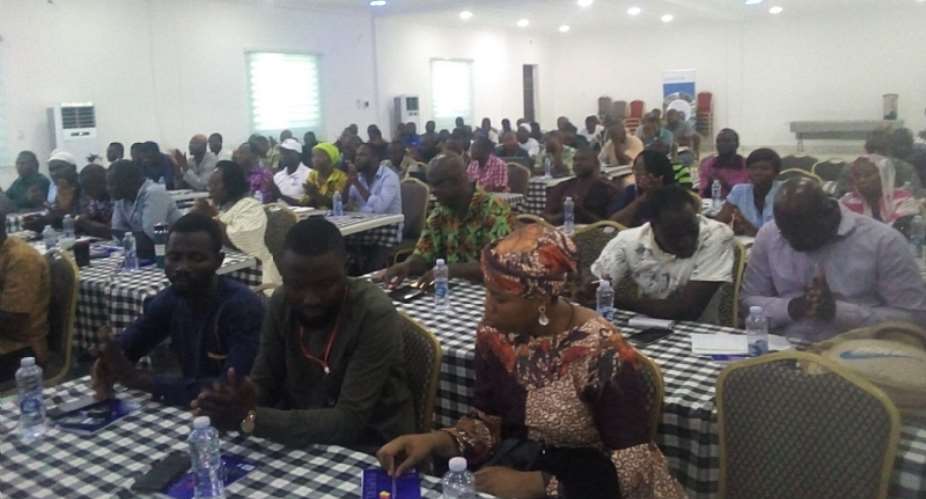Financial constraints have led to a gap in assessing the agriculture sector's performance thereby hindering informed decision-making and improvement of the sector.
Logistical, infrastructure, and human resource constraints continue to also hinder the development of agriculture in the Northern Region, despite the potential of the sector to enhance food security, job creation, and economic growth of the country.
The Department of Agriculture therefore needs support to facilitate the dissemination and adoption of improved and appropriate technologies to increase crop production to feed the nation and also export the rest for foreign exchange.
Despite the few staff and logistical constraints, the region continues to record bumper harvests in production due to an increase in farm size, improved access to mechanization services, good agronomic practices, and the use of improved seeds by farmers, but a lack of agricultural extension to help expand the productions has been a problem, hence the call for support to help address issues hampering the sector for national growth.
Heads of the Department at the Department of Agriculture raised the concern at a two-day 2024 annual and semi-annual regional agriculture sector performance review meeting held in Tamale.
The event, organized by the Regional Agricultural Department in collaboration with the Northern Regional Coordinating Council and supported by the Feed the Future (FTF) Ghana Policy LINK Activity, aimed at fostering collaboration and synergies among various actors within the agriculture sector and also served as a crucial mechanism for evidence-based decision-making by assessing existing policies, strategies, and programmes, such as Planning for Food and Jobs (PFJ), Rearing for Food and Jobs, and fertilizer distribution, among others.
It was observed that significant challenges in conducting the performance reviews stem primarily from limited and inconsistent financial resources and the overdependence of the Ministry of Food and Agriculture (MoFA) on development partners to fund the Joint Sector Review (JSR) meetings, hence affecting the regularity of the reviews.
The Northern Regional Director of Agriculture, Hajia Hawa Musah, commended the various departments for their contribution towards enhancing agricultural productions in the region.
She underscored the need for stronger linkages to resolve issues related to accessing planting materials, relevant inputs, appropriate processing technologies, crop produce handling, storage, and market access constraints.
She emphasized the importance of fostering networking, knowledge sharing, and learning opportunities across the entire agricultural value chain to drive agricultural development and modernization within the region.
She reiterated the government's commitment to supporting the growth of the sector for national development.
Senior Regional Manager at Policy Link, Mr. Anthony Maxwell Etuah, reiterated the commitment of Policy Link to collaborate with other USAID Implementing Partners and Development Partners to support the Regional Coordinating Councils and Regional Agriculture Departments (RCCs and RADs) in the four ZOI regions to organise both annual and semi-annual performance review meetings.
He encouraged the various value actors to develop concepts and proposals tailored to policy development for support from the organization.
The Northern Regional Monitoring and Evaluation Officer of the Department of Agriculture, Mr. Felix Oteng Dwaah, stressed the need for the district assemblies to support the departments with internally generated funds to embark on their activities.
He noted that effective and efficient monitoring would be made to assess the state of the sector and also ensure the funds invested into the sector are used for its purposes.





 Election 2024: NPP done so much and deserves victory — Akufo-Addo
Election 2024: NPP done so much and deserves victory — Akufo-Addo
 AG has 'killed' Cecilia Dapaah matter; 'abrupt end' fits clearing-agent pattern—...
AG has 'killed' Cecilia Dapaah matter; 'abrupt end' fits clearing-agent pattern—...
 Former Weija-Gbawe MCE Patrick Kumor dies
Former Weija-Gbawe MCE Patrick Kumor dies
 Ghanaian Musician Itztiffany’s sister jailed in US
Ghanaian Musician Itztiffany’s sister jailed in US
 Cecilia Dapaah scandal: Withdraw letter to EOCO – Martin Kpebu to AG
Cecilia Dapaah scandal: Withdraw letter to EOCO – Martin Kpebu to AG
 IMF calls for tariff adjustment to enhance Ghana's energy sector cost recovery
IMF calls for tariff adjustment to enhance Ghana's energy sector cost recovery
 SML-GRA Contract: Insufficient evidence to prosecute government officials — Afen...
SML-GRA Contract: Insufficient evidence to prosecute government officials — Afen...
 Ketu North: NDC holds ‘Victory Health Walk’ ahead of election 2024
Ketu North: NDC holds ‘Victory Health Walk’ ahead of election 2024
 Tema Port truck drivers to embark on sit-down strike on May 6
Tema Port truck drivers to embark on sit-down strike on May 6
 Walewale NPP: Constituency Chairman endorsement of Tiah Mahama as PC prejudicial...
Walewale NPP: Constituency Chairman endorsement of Tiah Mahama as PC prejudicial...
